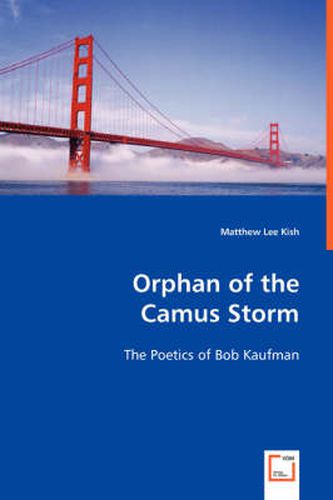Readings Newsletter
Become a Readings Member to make your shopping experience even easier.
Sign in or sign up for free!
You’re not far away from qualifying for FREE standard shipping within Australia
You’ve qualified for FREE standard shipping within Australia
The cart is loading…






This title is printed to order. This book may have been self-published. If so, we cannot guarantee the quality of the content. In the main most books will have gone through the editing process however some may not. We therefore suggest that you be aware of this before ordering this book. If in doubt check either the author or publisher’s details as we are unable to accept any returns unless they are faulty. Please contact us if you have any questions.
More than 20 years before his death, Beat poet Bob Kaufman (1925 - 1986) took a vow of silence that he honored for all but a handful of his remaining years. Unfortunately, this silence has seemingly made it easy to dismiss Kaufman in favor of self-promoting Beats such as Allen Ginsberg and Jack Kerouac. A growing number of scholars, however, are taking the time to reexamine the poetry of Bob Kaufman. As they do, they propose various explanations for his silence, which infects both his poetry and his biography. This book offers a new theory. It argues for a historical reading. It posits that Kaufman uses silence to respond to the oppressive con-formity of the mid-twentieth century. By remaining obscure, Kaufman rejects the suburban middle-class value system of the time and pro-hibits the reader from placing him within taxonomies based on class, race, and gender. As such, Kaufman forces the reader to start from scratch when asking questions about identity. Jazz, then, becomes the ideal tool for Kaufman because it works through spontaneity and im-provisation and the defeat of embedded forms and structures.
$9.00 standard shipping within Australia
FREE standard shipping within Australia for orders over $100.00
Express & International shipping calculated at checkout
This title is printed to order. This book may have been self-published. If so, we cannot guarantee the quality of the content. In the main most books will have gone through the editing process however some may not. We therefore suggest that you be aware of this before ordering this book. If in doubt check either the author or publisher’s details as we are unable to accept any returns unless they are faulty. Please contact us if you have any questions.
More than 20 years before his death, Beat poet Bob Kaufman (1925 - 1986) took a vow of silence that he honored for all but a handful of his remaining years. Unfortunately, this silence has seemingly made it easy to dismiss Kaufman in favor of self-promoting Beats such as Allen Ginsberg and Jack Kerouac. A growing number of scholars, however, are taking the time to reexamine the poetry of Bob Kaufman. As they do, they propose various explanations for his silence, which infects both his poetry and his biography. This book offers a new theory. It argues for a historical reading. It posits that Kaufman uses silence to respond to the oppressive con-formity of the mid-twentieth century. By remaining obscure, Kaufman rejects the suburban middle-class value system of the time and pro-hibits the reader from placing him within taxonomies based on class, race, and gender. As such, Kaufman forces the reader to start from scratch when asking questions about identity. Jazz, then, becomes the ideal tool for Kaufman because it works through spontaneity and im-provisation and the defeat of embedded forms and structures.